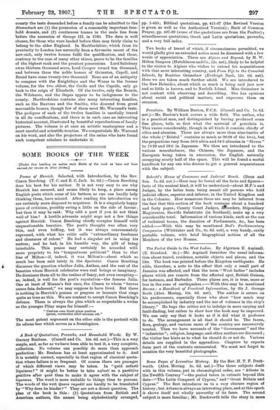SOME BOOKS OF THE WEEK
. [Under this heading ere notice sue. Books of the week as hare not been cursed for review in other forme.]
Poems of Herrick. Selected, with Introduction, by the Rev. Canon Beeching. (T. C. and E. C. Jack. 2s. 6d.)—Canon Beeching does his best for his author. It is not very easy to see why Herrick has secured, and seems likely to keep, a place among English poets which some of his betters, as one can hardly help thinking them, have missed. After reading the introduction we are certainly more disposed to acquiesce. It is a singularly happy piece of criticism, possibly erring a little on the side of favour ; but then it may be said Why edit a poet if you do not think well of him? A hostile advocate might urge not a few things against Herrick. Canon Beeching chiefly occupies himself with unquestionable beauties. The poet's thought was often very thin, and even trifling, but it was always consummately expressed, with what his critic calls "extraordinary freshness and cleanness of colour." He had a:singular art in using his metres ; and he had, in his humble way, the gift of being inimitable. This praise may certainly be accorded with more propriety to his "tempestuous petticoat" than to that line of Milton—if, indeed, it was Milton's—about which so much has been said lately in the Spectator. Canon Beeching discusses the question whether Julia, Anthea, and the rest of the beauties whom Herrick celebrates were real beings or imaginary. He dismisses them all to the realms of fancy, not even excepting— es, indeed, is well for the poet's reputation—the famous Julia. One at least of Horace's fair ones, the Cinara to whom " breves anon feta dederunt," we may suppose to have lived. But there is nothing in Herrick's praises or prayers or laments that rings quite as true as this. We are content to accept Canon Beaching's defence. There is always the plea which so respectable a writer as the younger Pliny urges for himself :- " postern eseo decet plum poetam versieulos mlui nevem est."
The most potent argument on the other aide is the portrait with its odious leer which serves as a frontispiece.










































 Previous page
Previous page